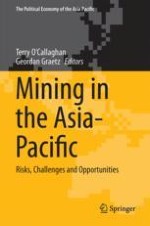2017 | Supplement | Buchkapitel
12. Natural Gas
verfasst von : Vlado Vivoda
Erschienen in: Mining in the Asia-Pacific
Aktivieren Sie unsere intelligente Suche, um passende Fachinhalte oder Patente zu finden.
Wählen Sie Textabschnitte aus um mit Künstlicher Intelligenz passenden Patente zu finden. powered by
Markieren Sie Textabschnitte, um KI-gestützt weitere passende Inhalte zu finden. powered by
